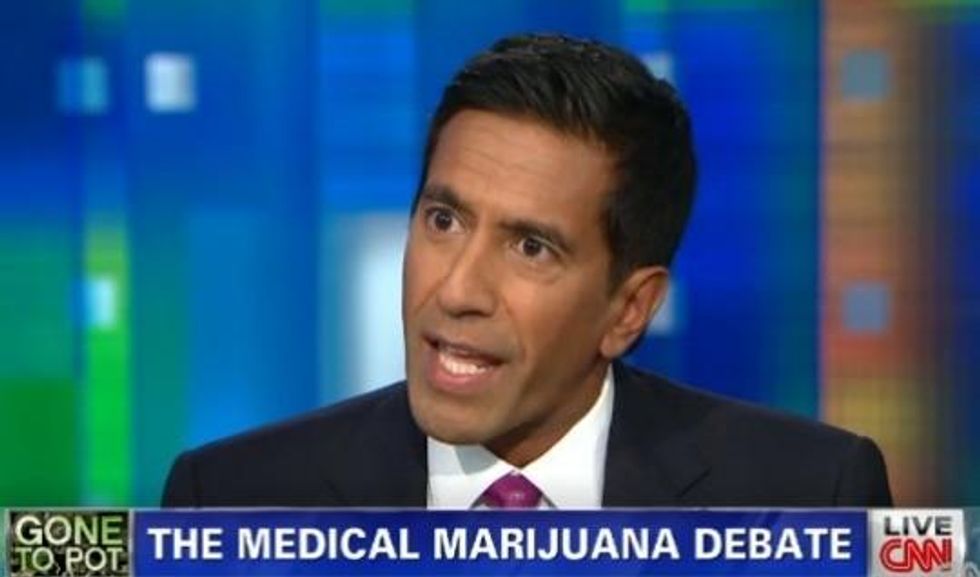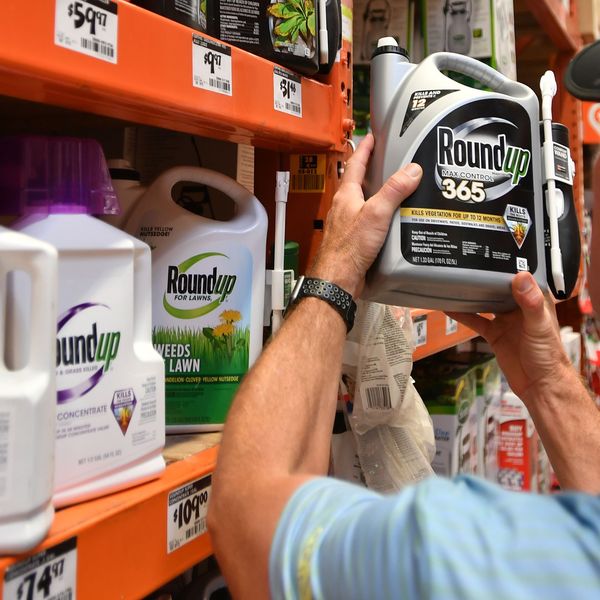Dr. Sanjay Gupta: I Was Wrong About Medical Marijuana
CNN's chief medical correspondent does about-face in advocating medical uses of cannabis

In an op-ed entitled "Why I changed my mind on weed," Gupta writes that he is "here to apologize" because he failed to do adequate research on medical marijuana, and did not review scientific literature from abroad on "remarkable research" on it. He writes:
I mistakenly believed the Drug Enforcement Agency listed marijuana as a schedule 1 substance because of sound scientific proof. Surely, they must have quality reasoning as to why marijuana is in the category of the most dangerous drugs that have "no accepted medicinal use and a high potential for abuse."
They didn't have the science to support that claim, and I now know that when it comes to marijuana neither of those things are true.
Dr. Wendy Chapkis, author of several books including Dying to Get High: Marijuana as Medicine and a University of Southern Maine professor, welcomed Gupta's comments, telling Common Dreams, "It's about time that the established medical profession" recognize the medical uses of cannabis.
Key in Gupta's comments, Chapkis continued, was that he called out the DEA's decades-long role in impeding scientific research on cannabis.
"For decades, our federal government has been playing a game to keep marijuana illegal," as Mason Tvert, communications director at Marijuana Policy Project explained to Common Dreams via email. But "that game is coming to end."
Gupta also told CNN's Wolf Blitzer he listened to "a legitimate chorus of patients for whom not only did marijuana work, it was the only thing that worked," and said there are some patients for whom marijuana can work better and more safely than pharmaceuticals.
Gupta slammed the national misinformation campaign around medical uses of marijuana, and his own culpability in it, writing in his op-ed:
We have been terribly and systematically misled for nearly 70 years in the United States, and I apologize for my own role in that.
Gupta's comments come days ahead of his one-hour documentary Weed, which takes a global look at marijuana.
Steph Sherer, executive director of Americans for Safe Access, which advocates for safe and legal access to therapeutic marijuana, was optimistic about the mainstream medical voice coming out in support of medical marijuana, stating that she hopes "it push[es] the federal government into action."
Tvert adds that Gupta's new opinion is also more in-line with that of the majority of Americans.
"More people than ever before are coming to realize that marijuana is not as harmful as they were led to believe. Recent polls show three out of four Americans now recognize the legitimate medical benefits of marijuana, and a majority thinks marijuana should be legal for adults," Tvert stated.
On Wednesday, All In With Chris Hayes guest host Ezra Klein spoke with Huffington Post reporter and This Is Your Country on Drugs author Ryan Grim about Gupta's turnaround and the barriers to scientific research on marijuana:
Visit NBCNews.com for breaking news, world news, and news about the economy
_________________________
An Urgent Message From Our Co-Founder
Dear Common Dreams reader, The U.S. is on a fast track to authoritarianism like nothing I've ever seen. Meanwhile, corporate news outlets are utterly capitulating to Trump, twisting their coverage to avoid drawing his ire while lining up to stuff cash in his pockets. That's why I believe that Common Dreams is doing the best and most consequential reporting that we've ever done. Our small but mighty team is a progressive reporting powerhouse, covering the news every day that the corporate media never will. Our mission has always been simple: To inform. To inspire. And to ignite change for the common good. Now here's the key piece that I want all our readers to understand: None of this would be possible without your financial support. That's not just some fundraising cliche. It's the absolute and literal truth. We don't accept corporate advertising and never will. We don't have a paywall because we don't think people should be blocked from critical news based on their ability to pay. Everything we do is funded by the donations of readers like you. Will you donate now to help power the nonprofit, independent reporting of Common Dreams? Thank you for being a vital member of our community. Together, we can keep independent journalism alive when it’s needed most. - Craig Brown, Co-founder |

In an op-ed entitled "Why I changed my mind on weed," Gupta writes that he is "here to apologize" because he failed to do adequate research on medical marijuana, and did not review scientific literature from abroad on "remarkable research" on it. He writes:
I mistakenly believed the Drug Enforcement Agency listed marijuana as a schedule 1 substance because of sound scientific proof. Surely, they must have quality reasoning as to why marijuana is in the category of the most dangerous drugs that have "no accepted medicinal use and a high potential for abuse."
They didn't have the science to support that claim, and I now know that when it comes to marijuana neither of those things are true.
Dr. Wendy Chapkis, author of several books including Dying to Get High: Marijuana as Medicine and a University of Southern Maine professor, welcomed Gupta's comments, telling Common Dreams, "It's about time that the established medical profession" recognize the medical uses of cannabis.
Key in Gupta's comments, Chapkis continued, was that he called out the DEA's decades-long role in impeding scientific research on cannabis.
"For decades, our federal government has been playing a game to keep marijuana illegal," as Mason Tvert, communications director at Marijuana Policy Project explained to Common Dreams via email. But "that game is coming to end."
Gupta also told CNN's Wolf Blitzer he listened to "a legitimate chorus of patients for whom not only did marijuana work, it was the only thing that worked," and said there are some patients for whom marijuana can work better and more safely than pharmaceuticals.
Gupta slammed the national misinformation campaign around medical uses of marijuana, and his own culpability in it, writing in his op-ed:
We have been terribly and systematically misled for nearly 70 years in the United States, and I apologize for my own role in that.
Gupta's comments come days ahead of his one-hour documentary Weed, which takes a global look at marijuana.
Steph Sherer, executive director of Americans for Safe Access, which advocates for safe and legal access to therapeutic marijuana, was optimistic about the mainstream medical voice coming out in support of medical marijuana, stating that she hopes "it push[es] the federal government into action."
Tvert adds that Gupta's new opinion is also more in-line with that of the majority of Americans.
"More people than ever before are coming to realize that marijuana is not as harmful as they were led to believe. Recent polls show three out of four Americans now recognize the legitimate medical benefits of marijuana, and a majority thinks marijuana should be legal for adults," Tvert stated.
On Wednesday, All In With Chris Hayes guest host Ezra Klein spoke with Huffington Post reporter and This Is Your Country on Drugs author Ryan Grim about Gupta's turnaround and the barriers to scientific research on marijuana:
Visit NBCNews.com for breaking news, world news, and news about the economy
_________________________

In an op-ed entitled "Why I changed my mind on weed," Gupta writes that he is "here to apologize" because he failed to do adequate research on medical marijuana, and did not review scientific literature from abroad on "remarkable research" on it. He writes:
I mistakenly believed the Drug Enforcement Agency listed marijuana as a schedule 1 substance because of sound scientific proof. Surely, they must have quality reasoning as to why marijuana is in the category of the most dangerous drugs that have "no accepted medicinal use and a high potential for abuse."
They didn't have the science to support that claim, and I now know that when it comes to marijuana neither of those things are true.
Dr. Wendy Chapkis, author of several books including Dying to Get High: Marijuana as Medicine and a University of Southern Maine professor, welcomed Gupta's comments, telling Common Dreams, "It's about time that the established medical profession" recognize the medical uses of cannabis.
Key in Gupta's comments, Chapkis continued, was that he called out the DEA's decades-long role in impeding scientific research on cannabis.
"For decades, our federal government has been playing a game to keep marijuana illegal," as Mason Tvert, communications director at Marijuana Policy Project explained to Common Dreams via email. But "that game is coming to end."
Gupta also told CNN's Wolf Blitzer he listened to "a legitimate chorus of patients for whom not only did marijuana work, it was the only thing that worked," and said there are some patients for whom marijuana can work better and more safely than pharmaceuticals.
Gupta slammed the national misinformation campaign around medical uses of marijuana, and his own culpability in it, writing in his op-ed:
We have been terribly and systematically misled for nearly 70 years in the United States, and I apologize for my own role in that.
Gupta's comments come days ahead of his one-hour documentary Weed, which takes a global look at marijuana.
Steph Sherer, executive director of Americans for Safe Access, which advocates for safe and legal access to therapeutic marijuana, was optimistic about the mainstream medical voice coming out in support of medical marijuana, stating that she hopes "it push[es] the federal government into action."
Tvert adds that Gupta's new opinion is also more in-line with that of the majority of Americans.
"More people than ever before are coming to realize that marijuana is not as harmful as they were led to believe. Recent polls show three out of four Americans now recognize the legitimate medical benefits of marijuana, and a majority thinks marijuana should be legal for adults," Tvert stated.
On Wednesday, All In With Chris Hayes guest host Ezra Klein spoke with Huffington Post reporter and This Is Your Country on Drugs author Ryan Grim about Gupta's turnaround and the barriers to scientific research on marijuana:
Visit NBCNews.com for breaking news, world news, and news about the economy
_________________________

